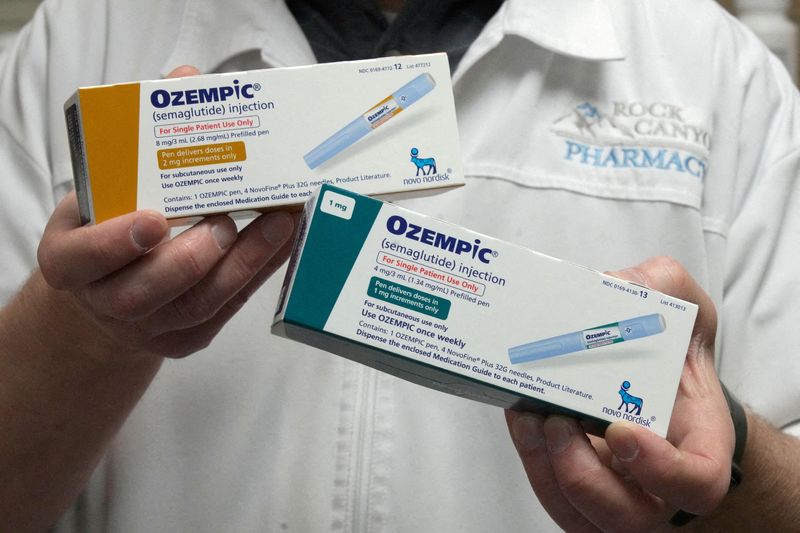By Michael Erman, Patrick Wingrove and Maggie Fick
NEW YORK (Reuters) - The U.S. pharmaceutical industry is pushing to revamp the new law that allows Medicare to negotiate prices for its costliest prescription drugs once president-elect Donald Trump is back in office, according to lobbyists, executives, analysts and healthcare policy experts.
Seven lobbyists and executives who work with top pharmaceutical and biotech companies told Reuters they are pushing to delay the timeline under which medications become eligible for price negotiations by four years for small molecule drugs, which are primarily pills and account for most medicines.
Two sources said the industry is already speaking directly with members of the Trump transition team.
The ability of Medicare for the first time to directly negotiate prices on selected medicines was part of the Inflation Reduction Act, considered one of the key achievements of the administration of outgoing President Joe Biden. Medicare covers 66 million Americans, mostly aged 65 and older.
Since the IRA was passed in 2022, drugmakers have complained about the terms of Medicare's negotiating powers, saying it would stifle innovation. The government says the drug price negotiations will save nearly $25 billion by 2031.
In particular, the industry has opposed the time frame for negotiation eligibility for most drugs. When drugs have no competition, the law allows the government to negotiate prices for complex biologic, or biotech, drugs after 13 years on the market, but after 9 years for drugs taken as pills and capsules.
Drug companies have said this will dissuade them from developing the medicines that are generally cheaper and easier to produce and more convenient for patients, and instead push them to prioritize researching biologics, which are most often given by infusion rather than taken at home.
Yet four drugmakers involved in the first U.S. Medicare negotiations reassured analysts and investors earlier this year that they did not expect a significant impact to their businesses after seeing suggested prices from the government that would take effect in 2026.
S. Sean Tu, a professor of law at West Virginia University, called 13 years of market exclusivity for all drugs "a terrible idea," adding that drugmakers would have enough financial incentive to innovate with just five years on the market.
Agreeing to extend the time for possible price negotiations from 9 to 13 years is "just giving a huge boon to the pharmaceutical industry with no payback," he said.
WAITING FOR REPUBLICANS
One source at a big pharmaceutical company said the company had both phone calls and in-person meetings with members of the Trump transition team to discuss possible changes to the IRA.
The company hopes a Republican Congress and the Trump administration would remove the distinction in how the easier to produce drugs are treated.
"They have been receptive," the source said, declining to say whom the company had spoken to on the transition team.
The Trump transition team did not respond to a request for comment.
Trump nominated industry critic Robert F. Kennedy Jr as secretary of the U.S. Department of Health and Human Services, which includes the agency that oversees Medicare and these negotiations.
Drugmakers are betting Republican lawmakers and the Trump administration will be more open to changing the IRA. One drug company executive, who spoke on the condition of anonymity, said Republicans were also concerned the law will hinder development of non-biotech medicines.
"I think there is increasingly a recognition that there are unintended consequences" of the IRA among Republicans, another pharmaceutical company executive said, speaking on condition of anonymity. "That's not just wishful thinking."
Pharma expects to piggyback on Republican moves to scrap some of the energy and green subsidy provisions in the legislation, three of the sources said.
In the first round of price negotiations, the Biden Administration cut what it will pay for 10 prescription drugs widely used by Medicare by as much as 79%. The move is estimated to cut revenue on those drugs, just three of which are biotech medicines, by billions of dollars.
In addition to the oral medications, injectable drugs like Novo Nordisk (NYSE:NVO)'s diabetes treatment Ozempic are considered small molecule drugs and subject to the shorter market time for negotiated prices. Ozempic, known chemically as semaglutide, is expected to be selected for the next round of Medicare negotiations in February, without changes to the law.
The companies expect to address the law through the budget reconciliation process, one of the industry lobbyists said. That process only requires a majority of votes in the Senate, rather than the 60 normally needed, for something to pass, and Republicans will hold a majority next year.
Full repeal of drug price negotiations is unlikely, four executives and industry experts acknowledged.

BMO analyst Evan Seigerman suggested Kennedy could be an impediment to pharma's plans for changing the law.
"Who knows if they can make that happen?," he said. "I don't think RFK would be very friendly to the industry."